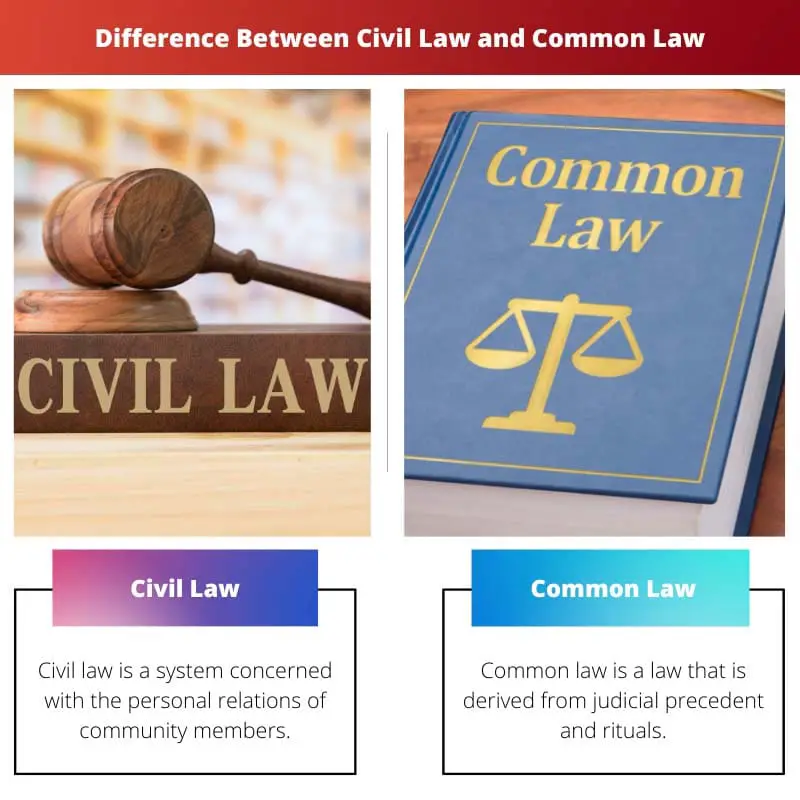Law is one of the essential requirements to form society. Law is something that makes humans lives different from wildlife. Law is necessary to provide equality and make every person stronger.
A person’s life has various aspects, and several laws have been written for every element. Common law and civil law are two such laws that influence the different parts of one’s life.
Key Takeaways
- Civil law is based on written codes and statutes, whereas common law relies on judicial decisions and precedents.
- In civil law, judges primarily interpret and apply the law, while in common law, judges have the authority to create new legal principles through their rulings.
- Most European countries follow the civil law system, while common law is predominantly found in English-speaking countries, such as the United States, the United Kingdom, and Canada.
Civil Law vs Common Law
The difference between civil law and common law is that civil law is concerned with the dispute or problem associated with the community. It applies and interprets legal norms to solve specific cases. Common law, on the other hand, the court resolves claims using unwritten bodies of laws and regulations. It provides guidelines for upcoming issues.

Civil law is a system concerned with the personal relations of community members. It does not emphasize military, criminal, and religious affairs. Civil law was originated from ancient Rome and was very prestigious in Europe.
This law regulates and looks after the non-criminal activities among people. Now, Civil Law is found in almost every nation.
Common law is a law that is derived from judicial precedent and rituals. Common law is a part of English Law, and it is not based on statutes.
A body of written law derived from legal precedents is absent in common law. The prominent element of Common Law is offer, acceptance, and consideration.
Comparison Table
| Parameters Of Comparison | Civil Law | Common Law |
|---|---|---|
| Structure | Civil law is a codified set of laws to provide justice to the people in need. | Common law is not a codified set of laws, and it is based on customs. |
| System | Civil law is an inquisitorial system meaning pre-trial hearings are under the judge’s control. | Common law is an adversarial system, meaning it involves the non-intervention part of the judge. |
| Judicial precedent | Civil law does not bind up the judicial precedent. | Common law binds up the judicial precedent. |
| Number of countries | Civil law is so practical and helpful that it is used in almost 150 countries around the world. | 80 countries use common law. The number is so low because it is not written anywhere. |
| Main source | The primary sources of civil law are subsidiary legislation and other statutes. | The primary sources of common law are case law and judicial precedents. |
What is Civil Law?
Civil law is a set of coded or written rules, regulations, and judicial precedents that are related to people rather than criminal matters. Civil laws originated in Europe and have progressively expanded throughout the whole world.
Civil laws play a vital role in maintaining order in society.
People are given certain rights, but without any rules, some people may use those rights to harm others or any wrongdoing.
Civil laws deal with personal matters related to people like property, Money, housing, Divorce, and custody of children in case of divorce, but civil laws do not deal with criminal issues.
A person whose right has been infringed can get compensation by suing the guilty person in court.
For instance, a person who has been swindled financially by an individual or a business can earn bonus by suing that individual or company.
The swindled person who initiates a civil case in court is known as the plaintiff, and the person or business who tricked is referred to as the defendant.
The plaintiff has the responsibility to prove in court that the defendant breached his rights. Unlike criminal law, civil laws do not punish offenders but provide recourse for damages.
Civil law is not just about individual rights but about the well-being of society.

What is Common Law?
Common law or called case law, is a body of unwritten legislation based on the court precedents.
The standard law system evolved in Great Britain in the 17th century during the colonial period, which further spread into several countries like India, Australia, Canada, Hong Kong, and New Zealand.
We also call them laws made by judges, as these common laws are the final verdicts taken by judges in several cases based on their experiences instead of considering the written legislation.
In other words, these laws are derived from the judicial decisions taken in previous cases.
Sometimes, the common law takes effect in unusual instances in which the final verdict cannot be rendered based on coded or written laws.
Consequently, the primary objective of common law is that a verdict given in a case by a judge can come in handy while handling another similar case, where coded laws cannot be implied.
For instance, a precedent from a District or a Session court may be used by parallel District or session courts to rule on similar matters.
However, this common law derived by lower courts can be declared null or void by the higher courts or amended accordingly, and thus the lower courts have to follow the common law amended by higher courts.
To epitome, a precedent of a Session court may be modified by honorable High courts.

Main Differences Between Civil Law and Common Law
- In civil law, judges tend to apply the rules that are already written, in other words, applicable codes, while in common law, a judge can make precedents and rulings for conflicting parties.
- The history of civil law shows that it was initially derived from Roman Empire. On the other hand, common law comes from the English legal system.
- Subsidiary legislation and different types of statutes are considered the primary source of civil law, while judicial precedent and case law are common law sources.
- Around 150 countries in the world include civil law in their justice system. On the other hand, common law is applied in 80 countries.
- Judicial precedent is a significant specification of law systems. Civil law does not have binding judicial precedents, while common law binds up the judicial precedents.

- https://www.degruyter.com/document/doi/10.1515/9781503607552/html
- https://www.degruyter.com/document/doi/10.4159/9780674054011/html
